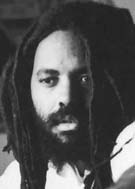![]()
Write us!
[email protected]
September 2004 • Vol 4, No. 8•
Black August
By Mumia Abu-Jamal
 “Among
these large bodies, the little community of Haiti, anchored in the
Caribbean Sea, has had her mission in the world, and a mission, which
the world had much need to learn. She has taught the world the danger
of slavery and the value of liberty. In this respect she has been
the greatest of all our modern teachers.”
“Among
these large bodies, the little community of Haiti, anchored in the
Caribbean Sea, has had her mission in the world, and a mission, which
the world had much need to learn. She has taught the world the danger
of slavery and the value of liberty. In this respect she has been
the greatest of all our modern teachers.”
—Frederick Douglass
It was a sweaty, steaming night in August, when a group of African captives gathered in the forests of Marne Rouge, in Le Cap, San Domingue. It was August, 1791.
Among these men was a Voodoo priest, Papaloi Boukman, who preached to his brethren about the need for revolution against the cruel slave drivers and torturers who made the lives of the African captives a living hell. His words, spoken in the common tongue of Creole, would echo down the annals of history, and cannot fail but move us today, 213 years later:
The god who created the sun, which gives us light, who rouses the waves and rules the storm, though hidden in the clouds, he watches us. He sees all that the white man does. The god of the white man inspires him with crime, but our god calls upon us to do good works. Our god who is good to us orders us to revenge our wrongs. He will direct our arms and aid us. Throw away the symbol of the god of the whites who has so often caused us to weep, and listen to the voice of liberty, which speaks in the hearts of us all.
The Rebellion of August 1791 would eventually ripen into the full-fledged Haitian Revolution, lead to the liberation of the African Haitian people, to the establishment of the Haiti Republic, and the end of the dreams of Napoleon for a French-American Empire in the West.
Two centuries before the Revolution, when the island was called Santo Domingo by the Spanish Empire, historian Antonio de Herrera would say of the place, “There are so many Negroes in this island, as a result of the sugar factories, that the land seems an effigy or an image of Ethiopia itself.” (From Paul Farmer, The Uses of Haiti, Monroe, Me.: Common Courage Press, 1994, p. 61.) Haiti was the principal source of wealth for the French bourgeoisie. In the decade before the Boukman Rebellion, an estimated 29,000 African captives were imported to the island annually.
Conditions were so brutal, and the work was so back-breaking, that the average African survived only 7 years in the horrific sugar factories.
In 1804, Haiti declared Independence, after defeating what was the most powerful army of the day: the Grand Army of France.
Haiti’s Founding Father, Jean-Jacques Dessalines, at the Haitian Declaration of Independence, proclaimed, “I have given the French cannibals blood for blood. I have avenged America.”
With their liberation, Haitians changed history, for among their accomplishments:
a) It was the first independent nation in Latin America; b) It became the second independent nation in the Western hemisphere; c) It was the first Black republic in the modern world; d) It was the only incidence in world history of an enslaved people breaking their chains and defeating a powerful colonial force using military might.
In many ways, Black August (at least in the West) begins in Haiti. It is the blackest August possible—revolution, and resultant liberation from bondage. For many years, Haiti tried to pass the torch of liberty to all of her neighbors, providing support for Simon Bolivar in his nationalist movements against Spain. Indeed, from its earliest days, Haiti was declared an asylum for escaped slaves, and a place of refuge for any person of African or American Indian descent.
On January 1st, 1804, President Dessalines would proclaim: “Never again shall colonist or European set foot on this soil as master or landowner. This shall henceforward be the foundation of our Constitution.”
It would be the U.S., not European, imperialism that would consign the Haitian people to the cruel reign of dictators. The U.S. would occupy Haiti, and impose their own rules and dictates. After their long and hated occupation, Haitian anthropologist Ralph Trouillot would say, “[it] improved nothing and complicated almost everything.”
Yet, that imperial occupation does not wipe out the historical accomplishments of Haiti.
During the darkest nights of American bondage, millions of Africans, in America, in Brazil, in Cuba and beyond, could look to Haiti, and dream.
—© Mumia Abu-Jamal, July 17, 2004
Write
us
[email protected]